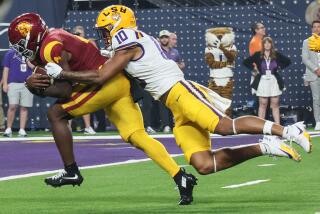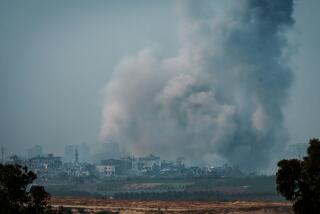Battle Success Helps Soften News Blackout
WASHINGTON — The military on Sunday began lifting the curtain of silence it had drawn around the ground war in the Gulf, in part because the allied invasion was such a success and in part because the curtain simply wasn’t holding.
One of those who objected to the news blackout, reporters in Riyadh, Saudi Arabia, were told by military officials, was Gen. H. Norman Schwarzkopf, commander of the U.S. forces in the Gulf. After Secretary of Defense Dick Cheney announced to the nation Saturday night that the Pentagon was indefinitely imposing a complete news blackout, Schwarzkopf called Gen. Colin L. Powell, chairman of the Joint Chiefs of Staff, and told him that he wanted to hold a briefing Sunday morning. Powell won approval from Cheney, reporters were told.
The Pentagon similarly reversed plans to delay all pool reports from the front by routing them to censors in Riyadh, 300 miles from the front, rather than reviewing them in Dhahran, near the battlefield. If this plan had held, footage and print reports might not have been available this soon.
This reversal came after network bureau chiefs told defense spokesman Pete Williams that the Pentagon had betrayed the media’s trust by suddenly changing carefully arranged rules for the ground combat.
“I told Williams early this morning that I thought the pool system could easily collapse if it didn’t seem to be working in a timely fashion,” said ABC Washington bureau chief George Watson. “And I told him that we at ABC News would be very reluctant to go out on future pools until we could determine the ones in the field were working as we were led to believe they would.”
The pool system in Saudi Arabia already may be breaking down. By Sunday morning, hundreds of reporters in Dhahran had headed into the desert on their own, and in many cases they were successfully supplying the first accounts of the war. Among them was ABC correspondent Forrest Sawyer, whose team took its own portable satellite dish so it could broadcast from the battlefield.
And, only moments after Cheney laid down the news blackout, CBS carried a live telephone report from correspondent Bob McKeon, who had gone out on his own and was one mile from the front.
Another problem with the U.S. news blackout was that the French, British, Saudis and even Kuwaitis were less restrictive about information than were the Americans.
Within hours of the invasion, there were reports from French pools and footage of Saudi troops taking Iraqi prisoners. The Kuwaiti news agency was releasing information. And British reporters from ITN were showing dramatic footage: “The great Iraqi berm of burning oil pits and minefields turned out to be an anticlimax,” ITN reporter Sandy Gall said, showing pictures of tanks rolling into Kuwait.
Clearly, this was not what Cheney had in mind when he told the nation Saturday that it would hear little or nothing of the war for the foreseeable future.
“We cannot permit the Iraqi forces to know anything about what we’re doing, and for that reason I will not say anything tonight about the operation that is currently under way. We will have nothing to say about it for many hours,” Cheney said.
The Pentagon was certain that the public would support the new restrictions. “I want to assure all of you that we understand our solemn obligation to the American people to keep them informed of developments,” Cheney said, “but I am confident that they understand this policy to save lives.”
Later Saturday evening, however, Williams told journalists privately that contrary to the impression left by Cheney, there was little concern about security for the majority of Air Force, Navy or Marine operations.
Rather, the sensitive issue was the U.S. Army troops in western Iraq, whose precise location was a tactical surprise. For these troops it was true, Williams said, that even showing seemingly innocent details--footage that showed the markings of Iraqi military uniforms or what the terrain looked like--could give away troop locations.
NBC Washington bureau chief Tim Russert said he and others argued with Williams that they would eagerly excise any such material, but banning footage of guns or general print descriptions was excessive and unnecessary.
What’s more, Russert said, “we have had enormous amounts of information that we could have gone on the air with. We could have done it and we didn’t.”
Although arguments of the bureau chiefs may have had some impact, many journalists believe that the reason the news blackout did not hold was more simple.
“The thrust of this policy is to block out bad news under the excuse of security,” said Howell Raines, Washington bureau chief of the New York Times. “As it happens, they didn’t have any bad news.”
To a large degree, Raines believes that Cheney’s statement “was only a stark expression of a policy that the Defense Department has been trying to install from the start of this conflict. They want to use the legitimate need to withhold information to protect military security as a blanket excuse for installing a kind of information management that we have never had in this country. . . . They are trying to manage information from the war to suit their political purposes at home and that hasn’t changed.”
The sense from observers in the Gulf mirrored Raines’ assessment.
After pool reports finally began arriving in Saudi Arabia about 9 p.m., Kirk Spitzer, a Gannett News Service reporter who has been covering the 1st Marine Division, attached the following note to his editors at the end of his report:
“News reports from this division would have been filed hours earlier if not for the news blackout imposed by Defense Department. In a headquarters staff meeting with division officers this evening, the division public affairs director, Chief Warrant Officer Eric Carlson, said that the blackout was lifted early, ‘probably because the news was good and they wanted to counter Iraqi propaganda.’ ”
Spitzer continued, “If this assessment is correct, it begs the question of whether the blackout would have been lifted had news from the battlefield been bad. We should make the strongest possible objections to what appears to be overt manipulation of the press.”
Some believe that the effects of this could prove significant. “Long term, I think this has enormous consequences in terms of suspicions, skepticism and the whole postwar era and the next operation,” Russert said.
Even some former Pentagon officials agreed. “This was ill-advised, and badly handled,” said Fred Hoffman, former deputy assistant secretary of defense in the Reagan Administration. “I’ve never heard of this happening before.”
More to Read
Sign up for Essential California
The most important California stories and recommendations in your inbox every morning.
You may occasionally receive promotional content from the Los Angeles Times.










